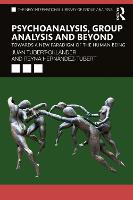Beginnings in Psychotherapy: A Guidebook for New Therapists

Book Details
- Publisher : Routledge
- Published : 2010
- Cover : Paperback
- Pages : 140
- Category :
Individual Psychotherapy - Catalogue No : 26652
- ISBN 13 : 9781855758384
- ISBN 10 : 1855758385
There are currently no reviews
Be the first to review
Every new therapist faces a first session, often with trepidation. How do they prepare for that first session? How do they know what tools to apply on that first day, and over those first few weeks? Beginnings in Psychotherapy will help readers to begin to answer those questions and start psychotherapy with increased confidence. In addition it will provide readers with an understanding of the foundational tools and background, as well as providing a comfort level with the new territory of becoming a therapist. In a conversational, accessible tone, the author shares his years of experience, without being dogmatic or dense. Instead, he engages readers warmly, immediately helps them expand their understanding and often helps them look at the pros and cons of certain decisions, without insisting that the readers follow a particular rule or policy.
Reviews and Endorsements
This book will serve as a guide for the 100,000 plus undergraduate and graduate students in all the disciplines that practice psychotherapy, including psychiatry, psychology, social work, art therapy and pastoral counseling. It should prove to be an ideal text for classes that introduce students to practical psychotherapy within their clinical experience.
'Presenting the framework and guiding principles of psychoanalytic psychotherapy for the beginning therapist is a daunting challenge. Dr Eichler expertly meets this challenge. The essentials of therapeutic interaction are concisely and lucidly explained and aptly illustrated with clinical vignettes. In this remarkable volume the fundamental principles of therapeutic technique, the underlying psychoanalytic theory from which technique derives, and the application of psychoanalytic formulations to clinical syndromes are discussed with insight. Conscious and unconscious, transference and counter-transference, regression and progression, all receive cogent explanation. Problems and pitfalls are carefully considered. Dr Seth Eichler has created a source book on dynamic psychotherapy that will be richly rewarding for students of psychotherapy at all levels of experience.'
- Harold P. Blum, MD, Director, Sigmund Freud Archives, Former Editor, Journal of the American Psychoanalytic Association, Training and Supervising Analyst, NYU Psychoanalytic Institute, NYU Medical Center
'This lively, easy to read guidebook for beginning therapists presents basic material to the new therapist in brief chapters that can be easily digested. It is filled with useful clinical examples, has enough theory to make sense of the clinical examples, but does not get bogged down in overly technical discussions or psychodynamic jargon. Dr Eichler's therapeutic empathy is here revealed toward his reader as he promptly anticipates questions that may occur to the beginner, either answering them on the spot or saying that they will be answered later in the volume. Everything written here is sensible and well thought out, and reading the book has the dual result of conveying essential information and comforting the reader. This volume is a find for new therapists and very instructive to those teachers who educate them.'
- Charles Tolk, MD, Director, NYU Psychoanalytic Institute, NYU Medical Center
'Dr Seth Eichler has created a primer on dynamic psychotherapy that will inform therapists who are beginners as well as practitioners in search of concise clinical viewpoints. This volume manages to explain some of the most difficult psychoanalytic concepts in a precise manner that is both simple and informative. I highly recommend this book to both beginners and seasoned professionals.'
- Samuel Herschkowitz, MD, Past Director, NYU Psychoanalytic Institute, NYU Medical Center
'Dr Eichler's book is an invaluable resource for all mental health practitioners. It guides not only the beginning therapist, but also provides an exceptionally useful organizing structure for those engaged in educating and supervising the beginning therapist.'
- Rachel Blakeman, JD, LCSW-R, Faculty, NYU Psychoanalytic Institute, NYU Medical Center,
Contents
Section I: Expanding Minds: Learning to Think Analytically
Chapter 1: On Beginnings
Chapter 2: On Meaning: Understanding Why We Do What We Do
Chapter 3: On Gratification and Deprivation
Section II: Tools and Techniques
Chapter 4: On Regression and its Use: Insight Oriented Versus Supportive Approach; Transference; Countertransference; Neutrality; Safety and Freedom; Confidentiality; Time: Frequency and Timelessness; Free Association; Silence; Ambiguity; The Couch
Chapter 5: The Frame: Time; The Physical Office; Money; Handling Missed Sessions
Chapter 6: Creating a Therapeutic Atmosphere: The Therapeutic Alliance
Chapter 7: The Consultation: The Analytic Inquiry
Section III: Putting it Together
Chapter 8: Guideposts for our Work in Listening and Intervening:
A. Empathy
B. Analytic Listening
C. Educating The Patient
D. Educating Patients On Their Jobs
E. Educating About Cure: How Treatment Works
F. On Listening II. Learning To Understand And Cure
G. On Resistance
H. Following The Affect
I. Off-Key Notes
J. Patterns
K. Keeping Self-Esteem In Mind
L. Going After Pain
M. Detective Work
N. The Three Areas Of Mental Content
O. Treatment As A Listening Focus
P. Context And Contiguity
Q. The Lecture And The Lab
R. Intervening
Section IV: "Our Patients Are Our Textbooks": Lessons From Clinical Cases
Chapter 9: Patient A. Educating About Cure; The Strands Of The Rope
Chapter 10: Patient B. Encouraging Self-Observation
Chapter 11: Patient C. Identifying Themes and Furthering Understanding Of How Symptoms Develop
Chapter 12: Patient D. Understanding The Repetition Compulsion And Unconscious Fantasy; Unconscious Fantasy; Working Through
Chapter 13: Patient E. Giving Patients New Insights About Common Themes; Symptoms Are Fueled By Gratification; We Work Pre-Consciously
Chapter 14: Patient F. Working With Dreams
Section V: Conclusion
Chapter 15: On Endings
Bibliography
About the Author(s)
Dr. Seth Eichler is Chairman of the Adult Psychotherapy Program, NYU Psychoanalytic Institute at NYU Medical Center. He has practiced psychotherapy for 27 years. He is a Training and Supervising Analyst at the NYU Psychoanalytic Institute and Instructor in both the Psychoanalytic Program and the Adult Psychotherapy Program. He is a past President of the Long Island Psychoanalytic Society and also teaches at the Zucker Hillside Hospital. He is the author of articles on psychoanalytic issues and psychiatric education and has been published in the Journal of the American Psychoanalytic Association and other professional journals.
Customer Reviews
Our customers have not yet reviewed this title. Be the first add your own review for this title.
You may also like
Psychoanalysis, Group Analysis and Beyond: Towards a New Paradigm of the Human...
Juan Tubert-Oklander
Price £29.99
Neuropsychoanalysis of the Inner Mind: A Biological Understanding of Human...
Teodosio Giacolini
Price £31.99







